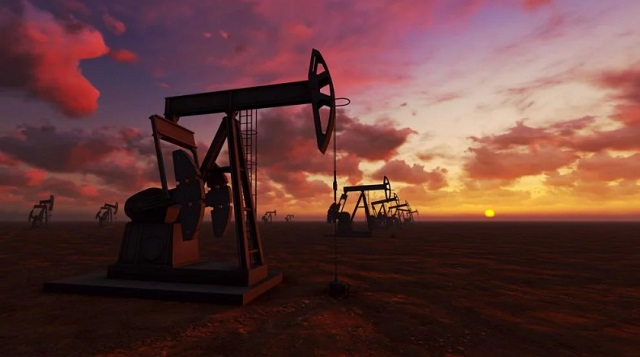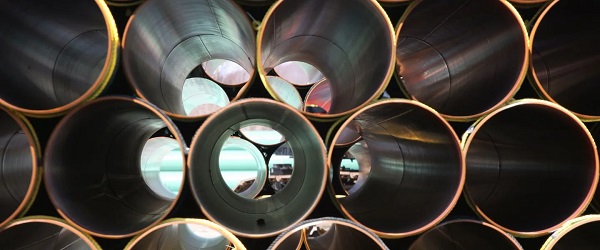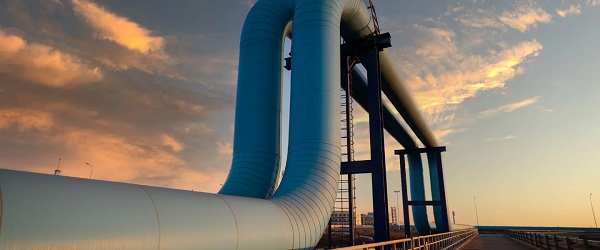Energy
Texas oil and natural gas production reached new record highs in July

From The Center Square
By
Texas’ oil and natural gas production reached new record highs in July, after breaking records in May.
Texas’ energy exports and production of natural gas liquids (NGLs) also broke records, according to new monthly energy economic analysis by Texas Oil & Gas Association.
TXOGA’s projections show that Texas set new records for crude oil production of 5.76 million barrels per day (mb/d); natural gas marketed production of 32.8 billion cubic feet per day (bcf/d); and natural gas liquids (NGLs) production of 3.85 mb/d – each setting record highs.
Texas’ petroleum value chain highlights for May 2024 also achieved records. Refiner and blender crude oil net inputs (5.69 mb/d) were the highest on record when evaluating EIA data that goes back to 1981.
Texas now accounts for 42.8% of all U.S. crude oil production and 28.3% of all U.S. natural gas marketed production year-to-date through July 2024, according to TXOGA estimates.
“The Lone Star State’s oil and natural gas industry is not only producing more, but doing so with unmatched efficiency,” TXOGA President Todd Staples said. “These latest numbers further reinforce the industry’s ongoing commitment to utilizing the latest technologies and innovations to produce abundant, affordable, and reliable energy.”

Texas exported $95.7 billion worth of energy products in the first five months of 2024, according to U.S. International Trade Commission data.
Texas exported $10 billion of crude oil primarily to Asia and Europe. Texas also exported nearly $6 billion worth of refined petroleum products, primarily to North America, Latin America and the Caribbean.
Natural gas exports accounted for $1.6 billion and hydrocarbon gas liquids, $2.2 billion.

Texas production records “underscore Texas’ dominant position in the U.S. energy market and ongoing contributions to national energy security,” TXOGA says.
While several news outlets have claimed oil and natural gas production records are a credit to Biden-Harris administration policies, those in the Texas industry point out that production records wouldn’t exist without Texas setting them.
Texas is leading in production because of a supportive state government and regulatory environment and facilities that primarily operate on private land, Texas industry experts have told The Center Square.
The Institute for Energy Research has identified over 200 actions the Biden-Harris administration has taken against the U.S. oil and natural gas industry, including halting federal onshore and offshore permits and leases, hamstringing production in other states.
As the Biden-Harris administration has advanced restrictions and threatened to tax and fine the industry, Texas Gov. Greg Abbott, the Texas legislature, state comptroller and the Texas Railroad Commission have implemented measures to facilitate production and safeguard the industry from federal actions.
While permits are held up by federal agencies, the RCC, which regulates the Texas oil and natural gas industry, continues to approve permits and implement conservation efforts, The Center Square has reported.
As the federal government advances investment policies targeting the fossil fuel industry, Texas law prohibits financial companies from implementing them and prohibits state government entities from investing in them.
Texas is also aggressively suing the Biden-Harris administration on several fronts. These include efforts to block EPA methane rules that would hamper the natural gas industry and blocking an attempt to classify lizards as endangered in the Permian Basin, one of the richest oil and natural gas fields in the world, among other policies.
Identifying threats posed by the current administration, those in the Texas industry have called on Congress to pass permitting reform, among other measures, The Center Square reported.
Staples also maintains that Texas’ production records “are not guaranteed. We cannot take for granted that this industry can continue to rewrite its record book in the face of federal policies blatantly designed to undermine progress. Delayed permits, canceled pipeline projects, closed and delayed federal leasing programs and incoherent regulations hurt American consumers and stifle our ability to deliver energy freedom and security around the world.”
Energy
B.C. premier’s pipeline protestations based in fallacy not fact

From the Fraser Institute
The latest war of words over a pipeline in Canada is between Alberta Premier Danielle Smith, who seeks the construction of a pipeline from Alberta’s oilsands to export facilities on the Pacific coast, and British Columbia Premier David Eby who is foursquare against it.
Smith argues the pipeline is needed to break the U.S. market-lock on Alberta oil, which the United States buys at a discount compared to world prices. Smith argues that increased trade in oil and gas—at higher prices—would be good for Alberta’s economy and Canada’s national economy, and can be done while protecting the environment in both provinces. Eby denies virtually all these claims.
More specifically, Premier Eby makes four arguments against a new pipeline, and all are incorrect.
First, he argues, any pipeline would pose unmitigated risks to B.C.’s coastal environment. But in reality, the data are clear—oil transport off Canada’s coasts is very safe (since the mid-1990s there has not been a single major spill from oil tankers or other vessels in Canadian waters). He also simultaneously argues that it’s pointless to build a new pipeline from Alberta because B.C.’s waters are protected by Bill C-48, the “tanker ban” bill enacted by the Trudeau government in 2017. But in fact, because Bill C-48 only applies to Canadian tankers, a regular stream of oil tankers and large fuel-capacity ships cruise up and down the B.C. coast (between Alaska and other U.S. ports) with stupendous safety records.
Second, Eby argues that B.C.’s First Nations oppose any such pipeline. But in reality, such opposition is quite contingent. The Trans Mountain pipeline expansion project (TMX), which has increased shipping capacity from Alberta to the west coast, has signed agreements with 81 Indigenous community groups (in both provinces) worth $657 million and produced more than $4.8 billion in contracts with Indigenous businesses.
Third, Eby claims that Smith’s proposal is not “real” because no private-sector companies have proposed to build the pipeline. And he’s partly right—no rational investor would look at the regulatory barricade facing pipeline construction and spend the time and money to propose a project. Those applications cost money and lots of it. In 2017, according to TC Energy,before it retracted its Energy East/Eastern proposals due largely to regulatory barriers, the company had spent more than C$1 billion trying to get permits. In a 2016 report, Enbridge listed pre-construction expenditures (which include crafting proposals) of up to US$1.5 billion to build its three proposed pipeline projects. These costs will not have gotten cheaper since then. But even so, the Alberta government’s pipeline proposal has the backing of an advisory group, which includes energy companies Enbridge, Trans Mountain and South Bow—likely because they want to invest in the project after there’s some assurance it will survive the regulatory blockade.
Finally, Eby’s claim that there’s no market demand for new pipelines (which implies there will be no investors) is unsubstantiated. According to S&P Global, Canadian oilsands production will reach a record annual average of 3.5 million barrels of oil per day (b/d) in 2025, five per cent higher than 2024. By 2030, production could top 3.9 million b/d, 500,000 b/d higher than 2024 (although this assumes the federal cap on emissions, imposed by the Trudeau government, does not curtail production as predicted). This profit potential will almost certainly attract investors, if they can overcome the regulatory blockade.
It’s fine, of course, for Premier Eby to look out for the people of B.C. as best he sees fit—that’s his job, after all. But it’s also his job to recognize the limits of his authority. When looking at the TMX project, the Supreme Court of Canada has already ruled that B.C. does not have the authority to block infrastructure of national importance, including pipelines.
But as the saying goes, you’re entitled to your own opinion but not entitled to your own facts. Premier Eby’s objections to another Alberta pipeline are rooted in fallacy, not fact. The Carney government should recognize this fact and decide whether or not another pipeline to B.C. waters is in the “national interest,” which is apparently how you get a permit to build major projects in Canada these days.
Energy
National media energy attacks: Bureau chiefs or three major Canadian newspapers woefully misinformed about pipelines

From the Fraser Institute
These three allegedly well informed national opinion-shapers are incredibly ignorant of national energy realities.
In a recent episode of CPAC PrimeTime Politics, three bureau chiefs from three major Canadian newspapers discussed the fracas between Alberta Premier Danielle Smith and Prime Minister Mark Carney. The Smith government plans to submit a proposal to Ottawa to build an oil pipeline from Alberta to British Columbia’s north coast. The episode underscored the profound disconnect between these major journalistic gatekeepers and the realities of energy policy in Canada.
First out of the gate, the Globe and Mail’s Robert Fife made the (false) argument that we already have the Trans Mountain pipeline expansion (TMX), which is only running at 70 per cent, so we don’t need additional pipelines. This variant of the “no market case” argument misunderstands both the economics of running pipelines and the reality of how much oilsands production can increase to supply foreign markets if—and only if—there’s a way to get it there.
In reality, since the TMX expansion entered service, about 80 per cent of the system’s capacity is reserved for long-term contracts by committed shippers, and the rest is available on a monthly basis for spot shippers who pay higher rates due largely to government-imposed costs of construction. From June 2024 to June 2025, committed capacity was fully utilized each month, averaging 99 per cent utilization. Simply put, TMX is essentially fully subscribed and flowing at a high percentage of its physical capacity.
And the idea that we don’t need additional capacity is also silly. According to S&P Global, Canadian oilsands production will reach a record annual average production of 3.5 million barrels per day (b/d), and by 2030 could top 3.9 million b/d (that’s 500,000 b/d higher than 2024). Without pipeline expansion, this growth may not happen. Alberta’s government, which is already coordinating with pipeline companies such as Enbridge, hopes to see oilsands production double in coming years.
Next, Mia Rabson, Ottawa deputy bureau chief of the Canadian Press, implied that Smith’s proposal is not viable because it comes from government, not the private sector. But Rabson neglected to say that it would be foolish for any company to prepare a very expensive project proposal in light of current massive regulatory legislative barriers (tanker ban off B.C. coast, oil and gas emission cap, etc.). Indeed, proposal costs can run into the billions.
Finally, Joel-Denis Bellavance, Ottawa bureau chief of La Presse, opined that a year ago “building a pipeline was not part of the national conversation.” Really? On what planet? How thick is the bubble around Quebec? Is it like bulletproof Perspex? This is a person helping shape Quebec opinion on pipelines in Western Canada, and if we take him at his word, he doesn’t know that pipelines and energy infrastructure have been on the agenda for quite some time now.
If these are the gatekeepers of Canadian news in central Canada, it’s no wonder that the citizenry seems so woefully uninformed about the need to build new pipelines, to move Alberta oil and gas to foreign markets beyond the United States, to strengthen Canada’s economy and to employ in many provinces people who don’t work in the media.
-

 Agriculture1 day ago
Agriculture1 day agoFrom Underdog to Top Broodmare
-

 Carbon Tax2 days ago
Carbon Tax2 days agoBack Door Carbon Tax: Goal Of Climate Lawfare Movement To Drive Up Price Of Energy
-

 City of Red Deer1 day ago
City of Red Deer1 day agoCindy Jefferies is Mayor. Tristin Brisbois, Cassandra Curtis, Jaelene Tweedle, and Adam Goodwin new Councillors – 2025 Red Deer General Election Results
-

 Alberta2 days ago
Alberta2 days agoCalgary’s High Property Taxes Run Counter to the ‘Alberta Advantage’
-

 Bruce Dowbiggin1 day ago
Bruce Dowbiggin1 day agoIs The Latest Tiger Woods’ Injury Also A Death Knell For PGA Champions Golf?
-

 Alberta1 day ago
Alberta1 day agoAlberta’s licence plate vote is down to four
-

 Digital ID2 days ago
Digital ID2 days agoThousands protest UK government’s plans to introduce mandatory digital IDs
-

 Health1 day ago
Health1 day agoSovereignty at Stake: Why Parliament Must Review Treaties Before They’re Signed





